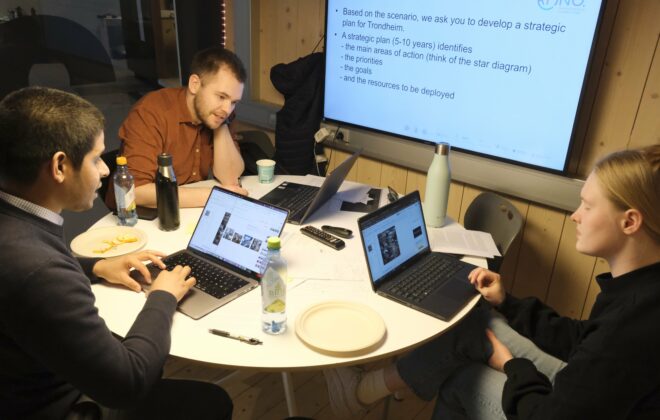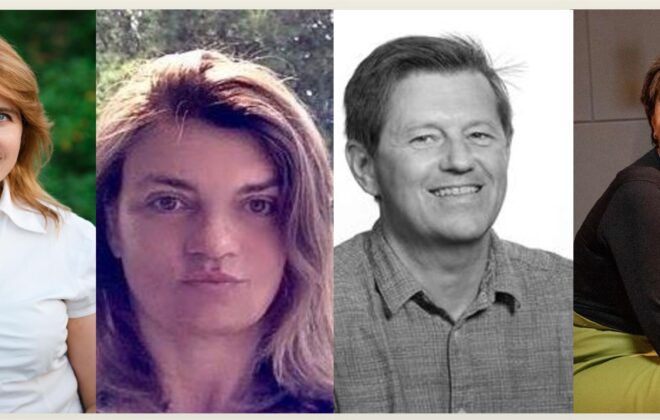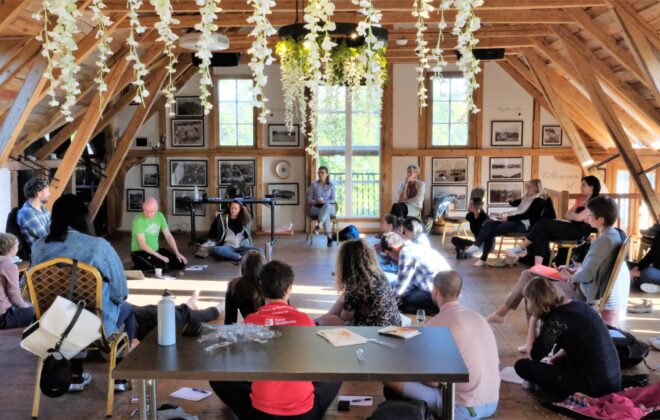What can the AFINO network do for me and what can I do for the network?
The AFINO 2021 workshop was a significant event in the development of the network and of the community it aims to support. Here we explain the steps that led to the concept and vision behind the workshop and its format. Lastly, we summarize some of the outcomes, pointing towards how we can work closer together in the future.
The long journey to a workshop
The AFINO 2021 workshop was a much awaited opportunity to gather the network members and other people interested in its work. The expectations around the meeting were heightened by the restrictions experienced during the Covid-19 pandemic.
But we had deeper reasons for being excited about this event. The structure and content of the workshop were the result of a long process that started at the end of 2020, when AFINO management group designed and distributed among the members of AFINO a thick questionnaire.

The aim of the survey was to understand in detail how the various teams in the AFINO network are working: what are their main goals, their ambitions, their relations with the challenges faced by our society, their methods and tools, their strategies to evaluate their achievements and how they are (or could be) interacting with other members of the network.
The results were analysed by a dedicated team and led to the organization of a webinar in April 2021, where three main topics were discussed: 1) how we understand and work with the concepts of Responsible Research and Innovation and of Corporate Social Responsibility; 2) which methods we are using in our work and research; 3) how we can evaluate whether we are achieving our aims and having the desired impact on society.
The webinar helped the members of the network to understand what each other is doing and hence to promote collaboration. It also made us aware that we do have many common concerns and challenges. Hence, we would greatly benefit if we find the most effective ways of learning from each other, sharing experiences and working together to address common problems.
Laying the foundation of an active and supportive network
The AFINO 2021 workshop was designed with the ambition of continuing on this path. We wanted to carry further the reflection on the values that guide our work and on methods and evaluation.
So, the workshop started with a session devoted to discussing these themes and how AFINO can help researchers dealing with the problems related to these issues. But we wanted to attract and include more researchers and especially young researchers working in transdisciplinary projects with great social relevance.

The AFINO 2021 workshop wanted to consolidate the identity and sense of purpose of the network and to start building a broader community. Furthermore, we wanted to build a shared sense of community and purpose that comes out of the experience and needs of its members. Therefore, we were happy when we in the end managed to include a considerable group of early-career researchers from several Norwegian research institutions.
What is the purpose of the AFINO community?
We have two ambitions. The first is to provide support to those who are carrying out research or projects that cross boundaries and meet new challenges. To address the social and environmental problems of our society, new approaches, capacities and solutions are needed.
Disciplines and sectors should work together, and innovation should be targeted to the most urgent and relevant issue.
However, it is well known that these kind of projects and researches are difficult and often the usual tools used within one discipline or sector are not fully fit for purpose. Another familiar problem is the time and work needed to enable people from different disciplines and sector to get to understand each other and find effective and satisfying patterns of collaboration. Furthermore, taking seriously the ideals of reflexivity, stakeholder involvement and co-creation means that the initial objectives may need some rethinking. Finally, the results of the projects or researches are often not those rewarded by university businesses or other important actors.
So, the most needed types of research and innovation are both at risk of not delivering the expected results (or needing more time than expected), and of not being adequately appreciated.
Thus, there is a high risk that people do not get the incentives and rewards that they need and deserve. AFINO wants to contribute to change this: we want to help the brave to succeed and enjoy their work.
The second ambition of AFINO is simply that of improving the chances that these socially relevant researches and projects bring benefits to society and help to tackle serious issues.
We believe that both ambitions need the construction of a community of researchers and practitioners that share the purpose of making their work beneficial for society, as well as fulfilling and rewarding. Such a community needs people to feel that they have enough in common, that they can trust each other, learn from each other, and that they can give and get help.
A safe space for our discomfort zone
An important ambition of the workshop was to create the presuppositions for building such a community. Some activities were designed with the intention of making participants feel safe and willing to be open and honest about challenges and possible failures and shortcomings. This was the aim of the games designed for the purpose of making it easier to think about undesirable outcomes and failures,
The feedback we got revealed that, not unexpectedly, some people love these kind of games, while some find games slightly uncomfortable, some even find them to be bordering on a waste of time.
From the organisers’ point of view, the combination of group discussions and the serious (but fun) games on the first day filled the purpose of lowering our guards and warming us up towards sharing our common and individual challenges and worries.
The Research School session on “the gap between intentions and outcomes in research” similarly aimed at opening up the room for discussing potential shortcomings, and also for raising questions about the way we have been structuring our research system. Both here and elsewhere during the workshop, it was argued that it is time to rethink our incentives and evaluation systems, and to challenge our conception of excellence.

With a little help from my (trusted?) network
To further encourage the practice of giving and receiving help, two sessions named “Help me AFINO” where designed, in which participants had the opportunity to submit questions or problems to be addressed by participants either in small task forces or in a plenary session.
We were very pleased with the response on this new format. A nice little pile of very diverse calls for help from both individual researchers, research groups and AFINO work packages were submitted ahead of the workshop. Our impression was that people really appreciated working on these tasks, and especially the task force format felt as a nice way of engaging across the network and learning from each other.
Several workshop participants praised the “Help me AFINO” format and suggested that we make it a regular part of future AFINO gatherings.

The theme of trust and collaboration was central in the exercise on system theory, where the participants that hung in there for the last session of a long workshop day were rewarded with an engaging and eye-opening session.
At some point, though, the experience took a turn towards eye-closing, when we all were blindfolded and left to trust our session leader while trying to work out how to efficiently communicate and who we should trust to make the right decisions on behalf of the group.
The good, the bad and the improvable
A supportive community also needs to give its members the opportunity to know what each is doing and therefore we chose to have more traditional sessions on day 2 of the workshop, with presentations based on submitted abstracts. We concluded the second day with guest speakers and a plenary session in which we tackled the issue of leadership for a network dedicated to responsible innovation. The vision that guided the design of the workshop was that of a network with a clear identity and purpose, but also open to a plurality of approaches and to diversity. This vision was summarized in the workshop title: One AFINO, many values.

So, did it work out? As always, a challenge was to balance the desire to pack the program full or interesting content with the desire to have plenty of time for the crucial coffee break talks. As always, there were some practical, logistical, and technical hick-ups, and as always there were some new (and repeated) lessons to learn in the ongoing journey towards “the perfect workshop”.
But in any case, our sense is that we managed to take a few steps towards building a cohesive and supportive AFINO network, and we want to extent a big THANK YOU to all of you who contributed to this.
————————————————————-
The feedback we received
Since the workshop programme was quite full, we collected feedback through an online questionnaire afterwards. We still managed to get 15 answers and some interesting results.
Asked to rate (1-100) how much the workshop matched their expectations, participants gave rather diverse answers. Three respondents were obviously disappointed, one gave an average rating of 53, four scored the workshop between 60 and 70, and seven scored it 80 or above, for an average of 66.73.

The second question asked what the workshop had been for the participants and allowed multiple choices. Here are the results:

Despite our effort to propose a different format, the traditional purpose of attending academic events (presenting one’s work and networking) still scores highest.
We are pleased that more than half of the respondents found that the workshop provided a useful moment of reflection and was a source of insights. But we regret that few respondents saw the workshop as a step in the creation of a supportive community and an occasion to discuss challenges and risk.
We were hoping that the workshop could achieve that, and we need to reflect whether participants are not so interested in the goal or whether the means we have tried were not the right ones to achieve it.
The rest of the questionnaire was made of open questions, which are difficult to summarise also because there was always a lot of diversity in the answers. For instance, asked what participants enjoyed the most, answers were distributed over all the sessions.
We also learned that there are many things that we could have done better, especially leaving people a little more breathing space and time to chat!
The final question about what participants would like most from AFINO again did not show a clear convergence on one or two things, showing instead how researchers needs and priorities vary, however it looks like a supportive network, interdisciplinary events, and research tools would be welcome by more than one respondent.
Featured image: Sophia Efstathiou (NTNU) engaging participants at the workshop with a game. Photo: Eva H. Murvold.

Giovanni De Grandis
Giovanni De Grandis has a PhD in Philosophy. In the last ten years he has worked in several transdisciplinary projects and initiatives in the areas of health, new technologies, innovation and public policy. He is the coordinator of the AFINO project and leads Work Package 2.

Siri Granum Carson
Siri Granum Carson is centre director of AFINO. You can read more about Siri on AFINO's webpage.




